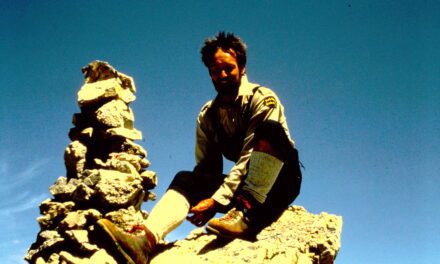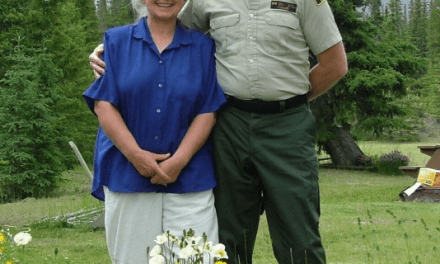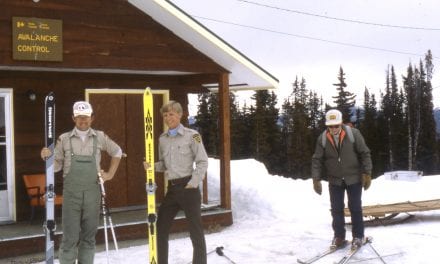(0:08:37) Well, I ranched before I became a warden. All through the time my dad was in the warden service which was about 27 years, he had a small ranch. He eventually got the ranch paid off and he paid a man there to look after things until he retired. He retired early, right after the Second World War. At that time they were anxious to let senior civil servants go to provide jobs for young men coming out of the army. So in 1947 he left Parks and moved to the ranch. I was on the ranch from the time I left high school which was 1946…until 1956. At that time I left the ranch because of personal reasons. I was married by then and I realized it wasn’t the kind of life that suited my wife. She seemed to have some health problems at the time and I thought, well, I have to make a change. So I worked for a couple of years for an oil industry company, actually an affiliate of United States Steel Oil Supply Company. I wasn’t all that happy. It wasn’t a bad job, but it wasn’t my kind of life. Somehow I heard or saw a poster that they were recruiting wardens, and I thought if anybody has the qualifications, I do. So I applied and I was accepted. I started on the warden service in early 1959, in Banff.
(0:11:31) I was an assistant warden, but I was full time. I wasn’t a seasonal… It was the district system back then…I was assigned to a warden by the name of Ernie Stenton, as his assistant, where I was for a couple of years. At Minnewanka, Parks bought a little private property called the Fairholme Ranch. That’s where we lived because there was a house there and it was in the Minnewanka district, but it was three miles removed from Stenton.
(0:12:39) I was just a couple more years in Banff. Then I applied for a district warden job in Kootenay Park, at Kootenay Crossing and I was successful in getting that appointment. So we moved to Kootenay. I was in Kootenay for three years, I guess. Our oldest son was in school by this time and my wife taught him by correspondence. Kootenay Crossing, as you probably know, is a long way from anywhere. There was no schooling. Of course, schooling was the perennial problem of the wardens throughout. If I had my druthers, I would have bid on a district like Stoney Creek and I would have stayed there forever! They’d never have gotten me out of there. But when you have kids, you’ve got some other priorities.
(0:14:18) Having children had a huge influence on my career with the parks service. Their education was a priority. Although a lot of other people may have said, the job came first; it never did with me or my wife. Our family came first. Although we were very serious about doing the job, that we were being paid to do, you also had to bring up your family and give them opportunity in life.
(0:15:20) From Kootenay, I came back to Banff, as the Assistant Chief Warden. Actually I was promoted very quickly through the ranks for whatever reason and I am not the best one to judge that. I was promoted over the heads of quite a few people which made my job a little tougher. But anyway, it all worked out in the end. I was in that job in Banff for two or three years under Chief Warden Bob Hand.
(0:16:27) I was then asked to go to Jasper as Assistant Chief Warden and I accepted going to Jasper although it wasn’t a promotion. I was interested in Jasper because it is a big park and it is a mountain park. It is always the Assistant Chief Warden who does all the backcountry inspections and the like. That was right up my alley. About … a month before I was to move to Jasper, I was asked by Harry Dempster to go to the St. Lawrence Islands in Ontario. Harry was transferred down there as the Regional Director in the central region of parks, or the eastern region I guess they would have called it then…Anyway he was based in Cornwall Ontario and he asked me to go down there as Chief Warden. Actually as Chief Warden you were running the park. It is a small park. You were Superintendent, Chief Warden, Maintenance Supervisor, and God knows what else! I had a staff of about 25 or 30 all told in the summer months and about a dozen throughout the winter months. I don’t recall the numbers, I am guessing, but that’s fairly close. And I had no secretary, no clerical staff, no anybody. There was only one permanent employee or quasi permanent, one that was paid as a park warden and he did mostly warden duties. That was it. He spent most of his life running up and down the river in a boat because the park was mostly islands on the St. Lawrence River.
(0:19:24) Especially when we were in Kootenay Park, my wife helped me with my warden duties. She was a busy person there! She had to teach our older son by correspondence and we were on a highway there. Winter and summer there was always somebody coming to the door for whatever reason, everything from being out of gas to having an accident. We had several injuries…and other reasons too numerous to mention. She was always there. Although she was never paid for it, she certainly was part of the operation, in a district in particular.
(0:20:46) I was only down in St. Lawrence Islands National Park for one year. One year and another summer,14 months or something like that. I was very unhappy there for the simple reason that they reclassified my position downward and I lost about $1500 a year which was huge. We were only making about $7000 then. It didn’t appear that there was anything that I could do about it. I was performing the function of a Superintendent of a small park and I was declassified to the point where it wasn’t just the money, it was the declassification that hurt as well. If I’d had stayed and gone to Jasper like I was originally asked to do I wouldn’t have been hit by that. So, I wasn’t very happy and I told them so. I told the Cornwall office that I was going to be looking for alternatives because I just wasn’t about to stand still for the way I’d been treated through some bureaucratic process which was a reclassification of the whole warden service. That wasn’t the MUST study (Management Utilization Study Teams) no, this was an exercise in everybody running around writing job descriptions and I guess whoever was the biggest BSer writing his job description did alright. I hadn’t written a job description, for that position. Somebody else had, but I ended up with the consequences. We talked about it as a family and I had always wanted to go to university. I applied to university in a couple of places. I applied to both Queens and the University of Calgary and I was accepted in both places and we opted to come back to Calgary because it was back in our country. We knew people there and so on. I was going to leave the service entirely and I will always be beholden to the Regional Director and one or two others in the Cornwall office because they came and had a talk with me and said, “Look, you don’t have to do this. You don’t want to give up your pension years and so on.” They said, “We can arrange for educational leave.” I said, “Well that would be great, if that can be done, I am certainly interested.” Anyway, they did that and for the university semesters I was on educational leave and on part salary. I can’t remember how much, for the duration of my degree course. I was accepted in the University of Calgary as a mature student because I had never matriculated in the old system back then because of where I grew up. I went to school in Waterton where there were only two teachers…The high school teacher had so many course to teach that he wasn’t allowed to teach a language. So I never got a credit for a language. I only had one year of French which I got in Grade 12 when I went to Pincher Creek to finish my high school. That’s how I ended up being accepted as a mature student. I had to go and have an interview with the Dean of Arts and Sciences and I guess it was up to him to make the ruling, which he did in my favour. I completed a Science Degree at the University of Calgary. I graduated with distinction; in 1970, I think. During the off season when I wasn’t in school, I worked in the regional office in Calgary, at whatever they needed somebody to work at. I worked primarily for Bruce Mitchell…he was Mr. Parks really. I had a great deal of respect for Bruce. Nobody knew any more about national parks than Bruce did. In the off season I worked in the regional office until I went back to school. In fact, I was working both at university and the regional office at times. The minute I’d finish my classes, I’d go back to work there. Every time I had an exam to write, I’d take time off and go and write the exam. But I couldn’t say enough about the organization for the way they gave me support. This was kind of a new thing. I think that I was the first one, that I know of that completed a university degree course under the auspices of the Park branch. Kurt Seal did it soon after I did… I thought a great deal of Kurt. He worked with me in Calgary. He was a tremendous, vigorous (employee). You couldn’t ask for a better employee. He was just filled with energy and he was probably one of the first real conservationists in the organization. The organization as far as Parks, was a conservation portfolio to start with, but Kurt really understood conservation, and he almost crusaded in it.



